- Home
- Lorenzo Carcaterra
Chasers Page 12
Chasers Read online
Page 12
Ramoni lifted his head and managed a weak smile. “I guess you won’t need that name from me, either.”
“Not unless that dead fucker Big Moe had vampire blood in those fat veins,” Monroe said. “But I appreciate you making the deal. I wouldn’t have trusted many badges to back up their word, even in the middle of a lost cause like that. But you were one of the few that wouldn’t step back from his end.”
“Save it for my eulogy,” Ramoni said.
“I’m sorry, Ramoni,” Monroe said, holstering his gun and gazing down at his blood-splattered clothes. “About you and your dog. She’s a fighter.”
“Take her, Monroe,” Ramoni said, lifting his head and reaching an arm out for the big man. “She doesn’t need to die. You can get her help, make her right again.”
“She took two hard ones at close range,” Monroe said, his hard voice touched with sympathy. “Best thing might be to just let her be.”
“She’s a cop,” Ramoni said. “She’s tougher than you and me glued together. Take her, Monroe, and save her life.”
“What about you?” Monroe asked.
“I can wait for backup and EMS,” Ramoni said. “I make it, I open a bar and you can drink your fill for free the rest of your days. But Buttercup can’t wait. You’re her best shot.”
“And what do I tell the cops?” Monroe said. “Police dog and me waltzing into an ER, both streaked with blood and running leaks like two garden hoses. Don’t need to be no fuckin’ Columbo to put together the two-and-two.”
“Tell them you were part of my undercover team, working Big Moe and his crew,” Ramoni said. “I’m still breathing when they locate me, I’ll back it. But even minus me there, they’ll believe you. Shit, you’re a shot-up man walking in with a wounded police dog. If Buttercup lives, the cops will be looking to pat your back instead of patting you down. You save a cop’s life, that’s a truth no one forgets.”
Monroe looked down at Buttercup, her breathing shallow, her back paws doing a slow shake, her closed eyes twitching. The blood was just easing out of her two wounds now, but she had lost more than enough to put her life clear in the red zone. “I hope to Christ you’re right about this shit,” he said.
“Bet your life on it,” Ramoni said, easing himself clear of the dog and giving Monroe the space he would need to get her in his arms.
“I am, dude,” Monroe said.
Monroe got down on his knees, wincing from the pain of his own wounds, jammed his hands and arms under Buttercup’s body, and lifted her to his chest, instantly feeling the rush of the warm blood flowing out of the dog’s body. Buttercup lifted her head up and rested it on Monroe’s chest, her eyes half open. Monroe looked back at her and shook his head. “You would have killed me in there,” he said to her. “And now here I go looking to save your ass. Bet you think I must be the biggest black fool this side of the East River.” Buttercup whipped out her thick tongue and quick-licked Monroe’s neck, then rested her head back down and shut her eyes. “Just like any woman,” he said to her. “You only turn nice when you want something.”
Monroe moved with a careful and steady purpose. He walked past shuttered tenement doors, the smell of gunpowder still strong in the air. The two of them, the wounded cop and the street shooter, leaving behind a thick trail of blood.
Ramoni crawled to a wall, pushed himself up to a sitting position, and watched them as they walked toward the shot-up exit sign at the end of the long hallway. He leaned his sweat-soaked head against a greasy door, closed his eyes, and rested his bloody hands at his sides.
“Good luck, partner,” were his last words.
17
Angel sat in a dark room, rolling the base of his wineglass between the fingers of his right hand as he listened to the man in the brown suit across from him, his slim frame lost in the center of a thick black leather chair. “I put the feelers out as per your request,” the man said. “And, as expected, I was given the answers I knew would come back my way.”
“Were there any surprises?” Angel asked.
“The band that likes to call themselves the G-Men were the most receptive,” the man said. “The two brothers who run that crew were open to a deal—more so than any of the other gangs, South American or otherwise. But again, they’re mercenaries. They hire out to whoever pays the most. If that ends up being you, then they will be loyal to you. At least until the next big offer comes their way.”
“What was the surprise, then?” Angel asked.
“They were the only ones who were aware of you,” the man said. “They didn’t say it with words but, rather, with their lack of them. The other gangs, they all asked me many questions. Who you were. Where you were from. Why they had never heard of you, either here or back in the home country. But not the G-Men. They said they knew you were good for the money and would make sure that your cash was well spent and not wasted in their hands.”
“Which gang will give us the biggest problem?” Angel asked, slow-sipping his chilled rosé.
“Take your pick,” the man said. “These crews, big and small, have fought hard to grab whatever turf they control. And they will do anything and everything in their power to ensure that turf remains in their grip. They’re not looking for partners, have no interest in bringing in new blood, and don’t lack for money and weapons. We’re walking into the middle of their gold rush, and up till now anyone who’s even attempted to take them on has been left in the marshes off the Whitestone Bridge. And not just their enemies, mind you, but their entire families as well. They leave no one and nothing behind. No family, no property, no witnesses. It would be as if you had never existed.”
“I don’t plan on being caught,” Angel said, resting his glass on an empty marble table to his right. “What can I expect from the other end?”
“The police here are very active,” the man said. “They are young and have no fear of getting into the middle of the action. And bringing down someone like you would be a huge notch on any young detective’s arrest sheet. Graft is at a minimum. They are, however, dealing with a city that has a high crime rate. Murder is rampant and drugs are in great demand, and there’s just so much an overworked police force, no matter how fierce and dedicated, can do. So from that end my advice would be to act with your usual care and keep a safe distance from the day-to-day activities. If you can sustain that, you should expect little police resistance.”
“Have you found anyone of interest we can reach?” Angel asked, digesting the man’s information. “Anyone who doesn’t seem to enjoy the pleasures of being overworked and underpaid? Anyone we can trust—to the extent, of course, we trust anyone at all?”
“A black rock can be found on the whitest beach,” the man said. He was short and well dressed, choosing for this first New York meeting a dark Brioni suit with matching loafers, crisp blue shirt, and a wine-red tie, looking a decade younger than his actual age of fifty-six. The man, whose name was Jonas Talbot and whose ethnic origins remained a mystery to all but his closest associates, was one of the most valuable criminal weapons a man newly launched in his venture could possess.
Jonas Talbot was a fixer.
He had connections spread across every major city and small town where the potential for corruption existed and the opportunity for criminal profit was evident. He had come to his profession by birthright, the only son of Lawrence “Bull Run” Talbot, the most renowned and respected fixer in the index of organized crime. Bull Run had worked for the legendary Arnold Rothstein and was rumored to have been instrumental in the setup of the notorious Black Sox scandal, involving the rigging of the 1919 World Series. From there, he went on to hone his craft and perfect it to the point where he could help a gangster establish any arrangement he sought, from opening a brothel to assassinating a dictator. He died at the age of eighty-seven, staring out at a two-hundred-acre horse farm complete with a freshwater pond and a running track, content that his life had been well spent. He had devoted a number of years to dispensing that knowledge, al
ong with all of his worldwide contacts, to Jonas, who, from the time he was old enough to toddle into his father’s elegant Upper West Side office, would sit, kneel, crawl, or stand as he listened in on his father’s often into-the-night business meetings, devouring the lessons that were learned in that room. It was a given to the few allowed to enter the tight Talbot family circle that Jonas would one day carry his father’s lucrative business to even more sophisticated heights, bringing the talents of a fixer into the new world order of organized crime. And this Jonas Talbot did with a master’s flourish.
Jonas was a determined and driven young man who would allow nothing to get in the way of the goals he had so lavishly set for himself. By the time he stood across the room from his newest client, Jonas Talbot had elevated the role of fixer to such a rarefied status that no high-end criminal working on any continent would set up shop without such a person in his employ. And of the two dozen men and three women who were ranked at the peak of their profession, none were a match for his talents.
“And does our black rock have a name?” Angel asked. “And worthwhile information that would constitute money well spent?”
“The very existence of a black rock necessitates that he does,” Talbot said. “As far as it being money well spent, that’s between buyer and seller.”
Angel refilled his wineglass from a crystal decanter and nodded. “Then let me hear what this police official can tell me for a price that I couldn’t find out on my own for free.”
“Sean Valentine is a former Brooklyn precinct captain now working out of One Police Plaza headquarters,” Talbot said, shifting his weight slightly as he moved closer to the warm waves of sunlight coming at him from an open window next to the floor-to-ceiling bookcases. “Valentine works in the community-relations division, a valuable place for him to be, since it allows total access to all police activity covering the five boroughs. On top of which he’s been with the department for slightly over two decades and is well liked by the upper tiers of that inbred culture. At the same time, he is respected by those who do the actual grunt work of arresting those who operate on the opposite side of the law.”
“And how much does such a talent cost?” Angel asked.
“You’re setting up a new business in a very complex and competitive city,” Talbot said in a professional tone. “And add to that the fact that yours is an illegal enterprise, one that often ends in either death or a multi-decade prison term. Not the best inducement to place on a recruitment poster. But, as luck has a tendency to embrace the profit side of the ledger, there has always been an overabundance of people eager to run such a risk for the reward. And Captain Valentine is one such individual.”
“You still haven’t answered the question,” Angel said. “How much am I into him?”
“Fifteen thousand a month,” Talbot said. “Double that for the month of December, plus five thousand every two weeks in spread-around money. The cash is to be placed in a PO box in Middle Village, Queens. The box will be paid and signed for by someone not known to either of us, but we will be given a key in order to gain access and make the required drops.”
“For that kind of money, this badge better come across like CNN with all news, all the time,” Angel said, waving his right hand in disgust as if brushing aside a gnat. “Otherwise, the last envelope I have put in that PO box will be his fucking ashes.”
“I agree,” Talbot said, having learned many years ago never to argue with or engage a client in anything beyond the business at hand. “The price is a steep one. And chances are better than good they will only go up in time. But you are the new face in the city, an unknown commodity, and in order for me to entice him to part ways with his last employer I needed to put forth the most attractive package I felt you could afford.”
“Who was his last employer?” Angel asked. “What lucky bastard got out from under his weight?”
“Rodrigo Duarte,” Talbot said. “A low-end heroin distributor loosely connected to and, on occasion, financed by the Paolo Murino crime family. In return for his monthly payouts, Duarte was told about any Joint Task Forces that might be picking him up on their radar and whether they had managed to place undercover agents or video surveillance anywhere near where he conducted his business transactions. It wasn’t what I would call fair market value for his money, but it helped Duarte feel that much the better for it and, in the end, that’s what matters.”
“To my ears, that’s fifteen thousand a month for two phone calls,” Angel said. “And if Duarte had himself stronger street antennas he could have a crew man make those two calls for him, keeping that money in his pockets.”
“Possibly true, but not a decision for me to make,” Talbot said. “And Duarte’s monthly bill wasn’t fifteen thousand. It was seven five. You’re paying double because that’s the only way I could get someone in Valentine’s position to come to your side.”
Angel stiffened in his chair and glared across the room at Talbot. He knew that he needed to have a man with such talents and connections in his employ, but he despised the very notion of such a need. Angel worked and thrived in a business where dirty hands were primary requirements and death a constant threat. He had little regard, then, for men like Jonas Talbot, who walked into their deals with clean hands and left the same way, with no track marks to even hint at their presence. Angel distrusted and disliked anyone who moved through life free of risk.
“And what has he told you about my side that I don’t know?” Angel asked.
“Several items of note,” Talbot said, ignoring Angel’s sarcasm. “The police investigation into the restaurant shooting has yet to gain traction, this despite mounting pressure from the mayor’s office to get a suspect—any suspect—in front of the television cameras. They are desperate to soothe the anger over the innocent bystanders the shooters murdered. The press, of course, has been playing the story for all it’s worth, citing it as one more example of a city where no one is safe with a clueless mayor at its helm.”
“They’re spot on when it comes to their mayor,” Angel said with a smile. “That guy is a drug dealer’s wet dream. Far as my money goes, he’s hands down the best this city has ever tossed into Gracie Mansion.”
“The police commissioner will add a dozen more detectives to the task force cobbled together to find the shooters, hoping the additional manpower will unlock a few doors.”
“Only if those doors are in downtown Bogotá,” Angel said. “Anywhere else, it would be nothing more than a waste of detectives, who could be out arresting muggers instead of hunting for ghosts.”
“The point being, I suppose, that this case is not going away, and if the NYPD should somehow fall across your name and activities it could have them looking your way,” Talbot said. “And that’s something none of us want to see happen.”
“Then you and Valentine make sure it doesn’t,” Angel said. “Because if it does, then it could have me come looking your way, and that’s something neither of you want to see happen.”
“There was one more item Valentine made mention of,” Talbot said, allowing the direct threat from Angel to fall by the wayside. A drug dealer, especially one attempting to scale the heights, had a life expectancy of anywhere from three to five years. And that’s only if he was both lucky and good at his work and had a crew that fit the same description. On both those ends, the jury was still out as far as Angel was concerned. A good fixer—or, in the case of Jonas Talbot, a great fixer—on the other hand, could stay in business until he died a rich old man. So most threats, if not all, were just lines in the ledger.
“Let me hear it,” Angel said. “Anything more, we can save for our next meeting.”
Talbot nodded and leaned against a thick mahogany wall. “One of the victims in the shooting was a young waitress making her way through school,” he said. “Wasn’t on the job very long and died at the scene.”
“So?” Angel said.
“So her uncle is a retired detective,” Talbot said. “Not the security
-guard type or one of those who turned to low-level private-eye work for extra rent money.”
“What’s he do, then?”
“It’s not what he does that should be of any importance to you,” Talbot said. “It’s what he once did. About three years ago, he formed a unit made up of detectives like himself. Fresh off the job, wounded, collecting a decent disability pension, but all young enough to miss the street action.”
“A unit that went and did what?” Angel asked, his interest piqued.
“They took down a drug queen named Lucia Carney,” Talbot said. “Wreaked havoc on her and her entire crew. In the process, they lost three of their own. Three of the original members are still around.”
“And Valentine thinks they’re going to look into this?” Angel said. “Come after the ones who did the restaurant shooting?”
“They went after Lucia Carney because a friend’s daughter was taken off the streets, tortured, and raped,” Talbot said. “This time, one of them had to stand and watch a young niece buried. I’m not saying they will, but there is a chance.”
“And it’s not just the shooters he’ll want,” Angel said.
“No,” Talbot said, shaking his head. “He’ll come after the man who hired the shooters. He’ll come after you.”
“This unit have a name?” Angel asked.
“They called themselves the Apaches,” Talbot said. “They claimed it was in honor of the wounded warriors left behind after a battle. True or not, they were an effective team—this despite the heavy manpower odds they found themselves up against. As of this moment, there’s no reason to believe they will reunite and come after anyone, let alone you. But the possibility does exist, and it is always best to be aware of the situation.”
“What do you suggest we do about these Apaches?” Angel asked, not so much concerned as curious.

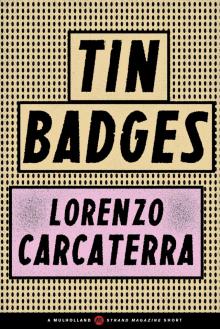 Tin Badges
Tin Badges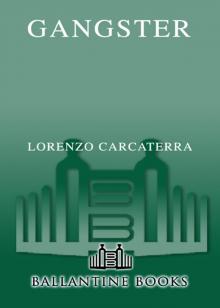 Gangster
Gangster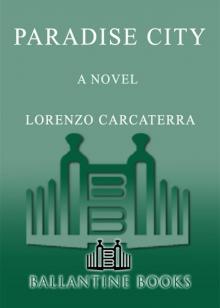 Paradise City
Paradise City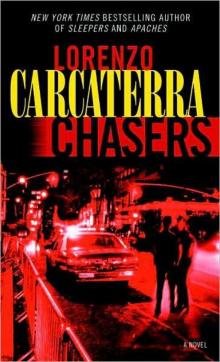 Chasers
Chasers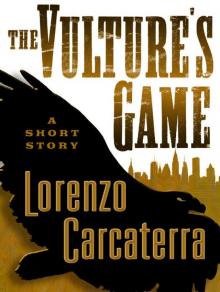 The Vulture's Game
The Vulture's Game Payback
Payback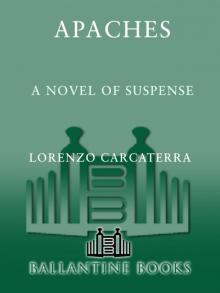 Apaches
Apaches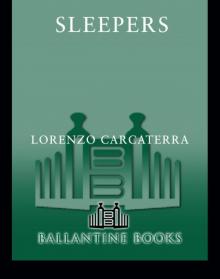 Sleepers
Sleepers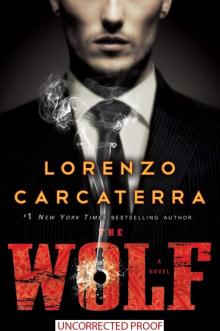 The Wolf
The Wolf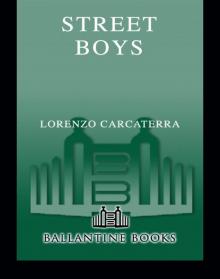 Street Boys
Street Boys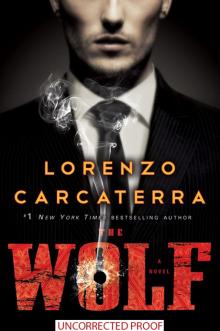 The Wolf: A Novel
The Wolf: A Novel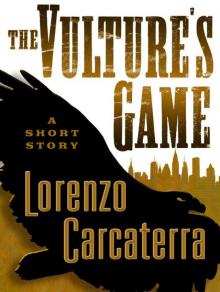 The Vulture's Game (Short Story)
The Vulture's Game (Short Story)